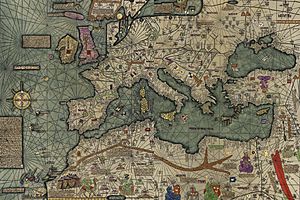Mediterranean Lingua Franca facts for kids
Quick facts for kids Mediterranean Lingua Franca |
|
|---|---|
| sabir | |
| Region | Mediterranean Basin (esp. Morocco, Algeria, Tunisia, Libya, Lebanon, Greece, Cyprus) |
| Extinct | 19th century |
| Language family |
Pidgin, Romance based
|
| Official status | |
| Official language in | none |
| Linguasphere | 51-AAB-c |

The Mediterranean Lingua Franca, or Sabir, was a contact language, or languages, that were used as a lingua franca in the Mediterranean Basin from the 11th to the 19th centuries. April McMahon describes Sabir as a "fifteenth century proto-pidgin" and "a relic of the original Lingua Franca, a medieval language used by Mediterranean traders and by the Crusaders." Operstein and McMahon categorize Sabir and "Lingua Franca" as separate but related languages.
Etymology
Lingua franca meant literally "Frankish language" in Late Latin, and it originally referred specifically to the language that was used around the Eastern Mediterranean Sea as the main language of commerce. However, the term "Franks" was actually applied to all Western Europeans during the late Byzantine Period. Later, the meaning of lingua franca expanded to mean any bridge language. Its other name in the Mediterranean area was Sabir, a term cognate of saber ("to know") in most Iberian languages and of Italian sapere and French savoir.
Origins
Based mostly on Northern Italy's languages (mainly Venetian and Genoese) and secondarily on Occitano-Romance languages (Catalan and Occitan) in the western Mediterranean area at first, Lingua Franca later came to have more Spanish and Portuguese elements, especially on the Barbary Coast (now referred to as the Maghreb). Lingua Franca also borrowed from Berber, Turkish, French, Greek and Arabic.
The grammar of the language used aspects from many of its lexifiers. Infinitive was used for all verb forms and the lexicon was primarily Italo-Romance, with a Spanish interface. As in Arabic, vowel space was reduced, and Venetian influences can be seen in the dropping of certain vowels and intervocalic stops.
History
This mixed language was used widely for commerce and diplomacy and was also current among slaves of the bagnio, Barbary pirates and European renegades in precolonial Algiers. Historically, the first to use it were the Genoese and Venetian trading colonies in the eastern Mediterranean after the year 1000.
As the use of Lingua Franca spread in the Mediterranean, dialectal fragmentation emerged, the main difference being more use of Italian and Provençal vocabulary in the Middle East, while Ibero-Romance lexical material dominated in the Maghreb. After France became the dominant power in the latter area in the 19th century, Algerian Lingua Franca was heavily gallicised (to the extent that locals are reported having believed that they spoke French when conversing in Lingua Franca with the Frenchmen, who in turn thought they were speaking Arabic), and this version of the language was spoken into the nineteen hundreds.... Algerian French was indeed a dialect of French, although Lingua Franca certainly had had an influence on it.... Lingua Franca also seems to have affected other languages. Eritrean Pidgin Italian, for instance, displayed some remarkable similarities with it, in particular the use of Italian participles as past or perfective markers. It seems reasonable to assume that these similarities have been transmitted through Italian foreigner talk stereotypes.
The similarities contribute to discussions of the classification of Lingua Franca as a language. Although its official classification is that of a pidgin, some scholars adamantly oppose that classification and believe it would be better viewed as an interlanguage of Italian.
Hugo Schuchardt (1842–1927) was the first scholar to investigate the Lingua Franca systematically. According to the monogenetic theory of the origin of pidgins that he developed, Lingua Franca was known by Mediterranean sailors including the Portuguese. When the Portuguese started exploring the seas of Africa, America, Asia and Oceania, they tried to communicate with the natives by mixing a Portuguese-influenced version of Lingua Franca with the local languages. When English or French ships came to compete with the Portuguese, the crews tried to learn the "broken Portuguese". A process of relexification caused the Lingua Franca and Portuguese lexicon to be substituted by the languages of the peoples in contact.
The theory is one way of explaining the similarities between most of the European-based pidgins and creole languages, such as Tok Pisin, Papiamento, Sranan Tongo, Krio and Chinese Pidgin English. Those languages use forms similar to sabir for 'to know' and piquenho for "children".
Lingua Franca left traces in present Algerian slang and Polari. There are traces even in geographical names, such as Cape Guardafui, which literally means "Cape Look and Escape" in Lingua Franca and ancient Italian.
Debate
Many aspects of Lingua Franca are still largely up for debate and different scholars have different opinions. That is because Lingua Franca was a primarily oral language, with some accounts of it and examples in literature, but very little by way of real examples of the language in use. That may also reflect the language's unfixed and changing nature.
Debated aspects are the language's classification and the origin of the term "lingua franca".
Although the language is officially classified as a pidgin, some scholars argue that to be inaccurate and pointing instead toward an interlanguage of Italian or a koiné language.
Alternate origins for the term lingua franca include its translation as "free language", perhaps referring to free trade, or a translation from Arabic meaning "Latin language" or "trade language". It has also been translated to mean "Venetician" or "western language" or simply to mean "French language".
See also
 In Spanish: Sabir para niños
In Spanish: Sabir para niños
- African Romance
- Mozarabic language
- Lingua Franca Nova

